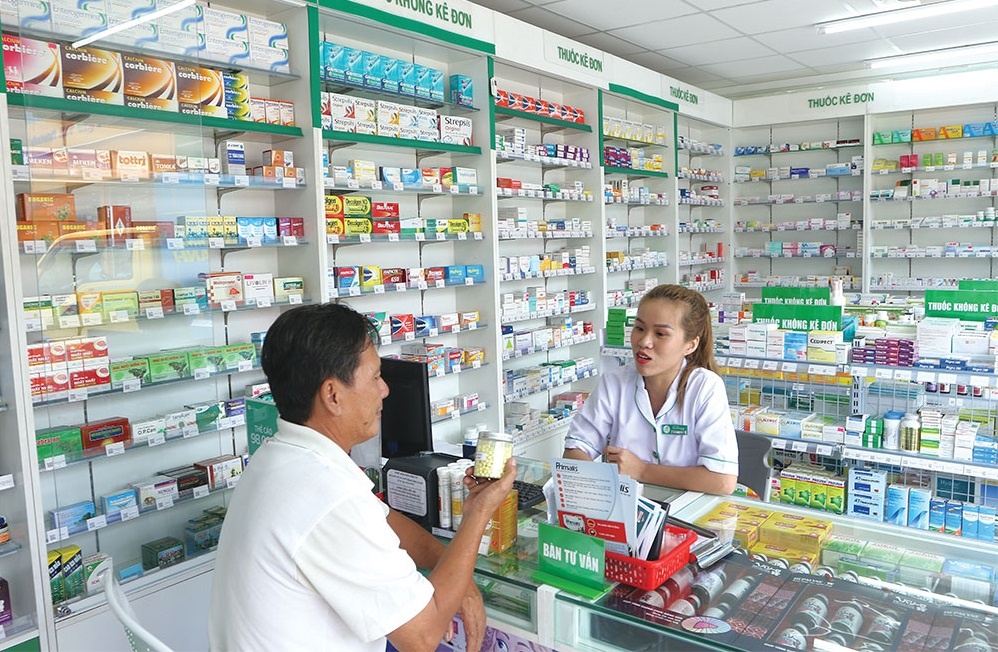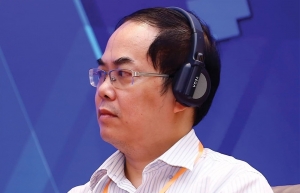Tougher rules necessary to deter drug sale breaches
 |
| Some items have been found for sale with inaccurate information regarding production or licence, photo Le Toan |
The Drug Administration of Vietnam (DAV) under the Ministry of Health (MoH) on September 19 sent a document to municipal and provincial departments of health about revocation and destruction of 250g bottles of Serum Burst lotion nationwide, due to unknown origin.
The move was made after Ho Chi Minh City Centre for the Quality Control of Food, Drug and Cosmetics took a sample of the product in August at Trieu Vy Cosmetics Production and Trading Co., Ltd. It is labelled as Vietnamese-made, but there is no information about production batch number, production date, expiration date, or licence number, as well as name and address of the manufacturer.
When scanning its QR code, the company name is displayed Coselvina Cosmetics Co. Ltd. The company said, however, that it has no production or business related to Serum Burst Lotion and all information about the company in the product is untrue.
At present, the Ho Chi Minh City Department of Health is working with relevant authorities and agencies to inspect Trieu Vy Cosmetics and impose fines if any violations are found.
In August, some pharma companies were fined for violating various rules. Mekophar Chemical Pharmaceutical JSC was fined VND40 million ($1,680) for selling Movinavir to establishments without a certificate of eligibility for pharmaceutical business.
Elsewhere, Minh Ky Pharmaceutical JSC was also imposed a fine of VND120 million ($2,000) for using false documents for Choludexan 300mg and Pompezo at both 40mg and 20mg.
The DAV also suspended drug import licences for Zuellig Pharma due to the company’s drug quality violations. The suspension will last one year, backdated from April 2023.
According to the DAV, within 12 months, Zuellig Pharma Vietnam Co., Ltd. imported two lots of Zinnat manufactured by Glaxo Operations UK; and two batches of Neurobion medicine manufactured by PT Merck in Indonesia, both of which violated quality regulation levels.
The MoH sounded the war horn several years ago for a charge against distribution of pharmaceuticals under the cover of providing preserving services by some foreign-invested enterprises, with Zuellig Pharma Vietnam being among the worst offenders.
Although stricter rules are applied, violations continue. The MoH now has rules to deter violators that include suspensions of business activities for 1-3 months if mobile drug retailing establishments fail to satisfy conditions; and suspension of violation-related activities for 6-12 months for forging papers announcing business establishment.
In addition, some guilty parties may even have their certificates of eligibility for pharmacy temporarily revoked for up to two years.
Insiders said that as Vietnam is a profitable pharma market, violators are willing to earn a big profit and then get a fine. The MoH estimated the market at $6.9 billion in 2021.
According to Business Monitor International, the scale of the Vietnamese pharma industry is likely to reach $16.1 billion by 2026.
“In Vietnam, pharma violations are currently met with two means of control, that being administrative sanctions or recalls. To a certain extent, they are useful deterrents and counter-measures to drug quality violations,” said Hoa Duong, managing partner of Indusviet Legal. “Controlling pharma violations is a hard task not only in Vietnam but also in other countries due to the complex nature of pharma products, people’s consumers’ awareness, and high profit.”
Nevertheless, Duong added, such violations should be treated with more severity due to their direct detrimental impact to consumers’ health and wellbeing.
Vietnam should consider turning pharma quality violations into criminal offenses for legal entities and provide a more specific framework for the compensation process,” she added.
According to the Vietnam Pharmaceutical Companies Association, drug quality violations are affecting business results of companies. “We estimate losses of hundreds of millions of US dollars annually from fake and low-quality pharmaceuticals,” said chairman Trinh Van Lau. “We expect more efficient rules from authorised agencies to deal with the situation.”
 | Stricter punishments could curb drug violations Restrictions in the last couple of years have caused disruptions in the global drug supply chain, so many kinds of drugs have not been supplied fully at certain times in a number of areas. |
What the stars mean:
★ Poor ★ ★ Promising ★★★ Good ★★★★ Very good ★★★★★ Exceptional
Related Contents
Latest News
More News
- PM outlines new tasks for healthcare sector (February 25, 2026 | 16:00)
- Ho Chi Minh City launches plan for innovation and digital transformation (February 25, 2026 | 09:00)
- Vietnam sets ambitious dairy growth targets (February 24, 2026 | 18:00)
- Masan Consumer names new deputy CEO to drive foods and beverages growth (February 23, 2026 | 20:52)
- Myriad risks ahead, but ones Vietnam can confront (February 20, 2026 | 15:02)
- Vietnam making the leap into AI and semiconductors (February 20, 2026 | 09:37)
- Funding must be activated for semiconductor success (February 20, 2026 | 09:20)
- Resilience as new benchmark for smarter infrastructure (February 19, 2026 | 20:35)
- A golden time to shine within ASEAN (February 19, 2026 | 20:22)
- Vietnam’s pivotal year for advancing sustainability (February 19, 2026 | 08:44)

 Tag:
Tag:




















 Mobile Version
Mobile Version